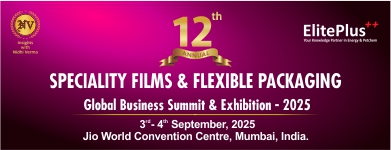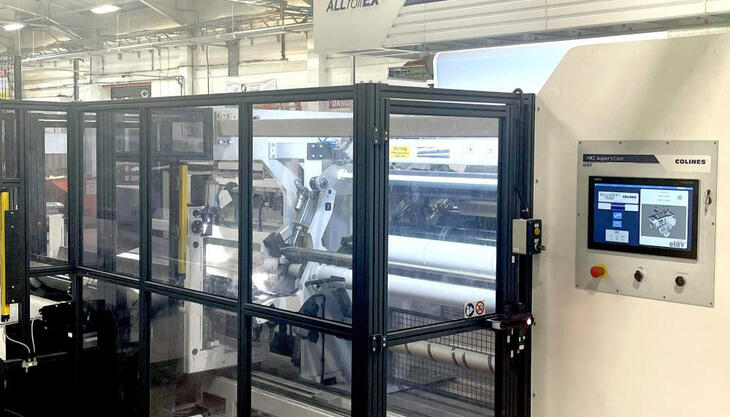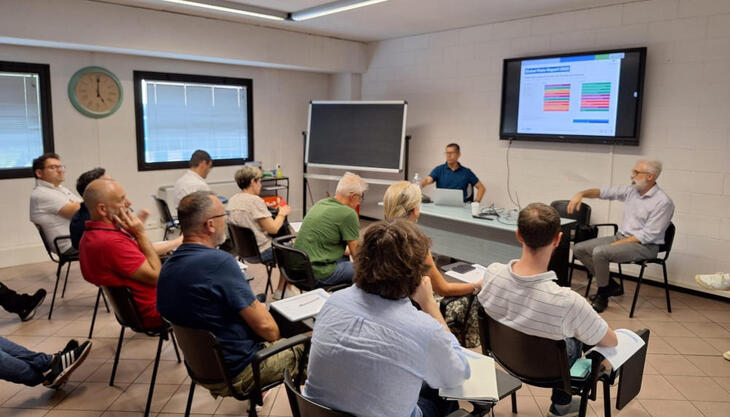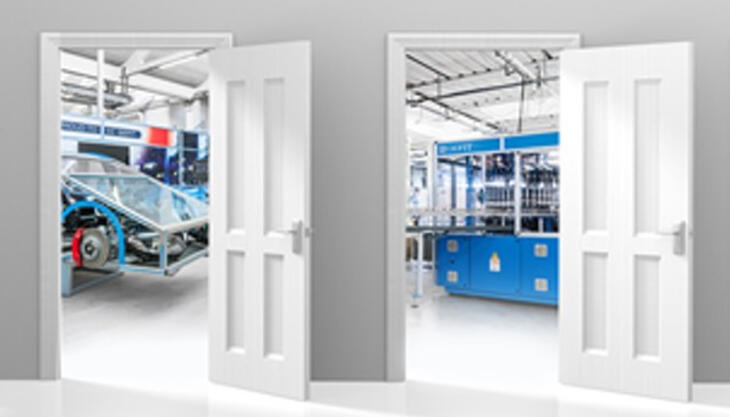JSW‘s MMA regeneration is industrializing: from waste to virgin
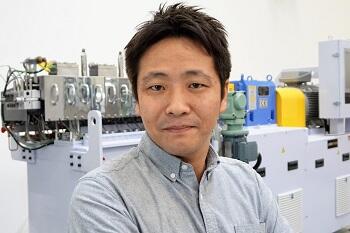
PMMA waste depolymerization is not only “nice to have” for the benefit of the environment (sea, land, air), but foremost a tremendous resource and capital that has hardly been exploited professionally on an industrial scale to this day. MMAtwo is tackling the economic solution to this environmental problem methodically. To this end, 13 European companies have joined forces and are moving forward within the framework of the EU Horizon 2020 programme. The technical focus is on the JSW Europe Extrusion Technical Center with a modified TEX44αIII twin-screw extruder. It is being used to run various PMMA depolymerisation test series.
The perception
“To recycle various types and mixtures of PMMA waste is not that easy. However, we are currently testing a process that - confident as we are - sets new accents on this topic in both ecological and economic terms," says Makoto Tojo, Technical Manager of Japan Steel Works Europe (JSW-EU), Dusseldorf/Germany. His colleague, Hayato Hobo, JSW-EU Sales Representative, explains the general framework conditions: “Most of plastics recycling (not limited to PMMA) is done by mechanical recycling as of now. In this process, the quality of plastic material becomes lower and lower every time the material is submitted to recycling. However, regeneration along with the depolymerization process can achieve conversion of the polymer into monomer. And PMMA is the polymer which can be regenerated to its monomer state by thermal depolymerization. Mind you: we cannot say that thermal depolymerization can be applied to all plastic materials. For example, polycarbonate is one of the competitors of PMMA from the optical properties point of view, but it cannot be depolymerized back to the monomer at all. Polystyrene can also be recycled by the same way but the yield is lower. For PMMA depolymerization, in Asia mostly, the dry distillation process is often used. The technology is low capital cost, but the purity of the recovered monomer is usually low, below the expectations of EU market. In addition, it is not very energy efficient and the range of PMMA grades which can be treated is limited. The conventional process for PMMA depolymerization in Europe is the molten lead-bath process. Only high-quality PMMA scraps such as post-industrial scrap can be recycled by this process. However, the depolymerization process using our TEX twin screw extruder can handle a wide range of PMMA waste materials including end-of-life scraps which contain inorganic contamination substances and we can realize the high yield. By success of the MMAtwo project, a huge amount of waste which is normally being landfilled, incinerated or exported can be recycled several times and used again and again.”
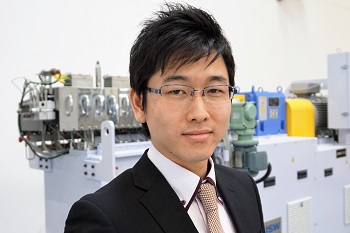
The facts and figures
PMMA (acrylic glass) has excellent optical and physical properties. It is used for glazing e.g. of caravans, facades, furniture, and vehicle taillights. Flat screens, neon signs, advertising, decorative and jewellery articles are also made of acrylic glass. IT, aerospace, medical and pharmaceutical industries use PMMA. For a market value of about one billion euros, some 300,000 tonnes of this material are currently produced each year in Europe alone. Just 10 per cent of this is being collected to be recycled. The much larger share is exported, landfilled, incinerated.
The project
Hayato Hobo explains the kick-off and the course of the MMAtwo project: “Arkema contacted us for the first time in June, 2017. We visited Paris and explained JSW’s patent in 1997, which is about PMMA chemical recycling. At that time, we didn’t know the plan for the project. In November 2017, we had a meeting with Arkema and Heathland, and they invited us to participate in the consortium as the key technology provider for depolymerization. The then founded MMAtwo consortium prepared and submitted the proposal to the responsible EU commission which subsequently approved the project and released the budget. So the MMAtwo project started in October 2018. The duration of this project is four years, and thus it will end in September 2022.”
The task is to develop an innovative process for recycling post-industrial and end-of-life PMMA waste into second-generation MethylMethAcrylate (MMA) raw material - i.e. rMMA - and to establish a sec-ond value chain for this plastic. This first step is followed by a big second one: MMAtwo is being formed on October 1, 2018. Thirteen companies from six EU countries are committed to the project under the coordination of Arkema/France and Heathland/The Netherlands: Quantis is a partner who provides the Life Cycle Assessment for the different design options for the MMAtwo value chain. PDC is developing the process design and carrying out the techno-economic assessments. Certech is the chemical partner to carry out emissions and odour analyses, and standardisation of the PMMA scraps analysis. Ghent University is the academic partner in understanding the depolymerization kinetics in-cluding the validation of the test values. Ecologic, Arkema, Delta Glass and Heathland are procuring the scraps. Heathland and Comet Traitements are responsible for material separation/pre-treatment. JSW-EU is responsible for the entire extrusion technology. Speichim undertakes the final purification of crude MMA, and Delta Glass, Arkema and Plados Telma have the role of end users of the regener-ated material recovered by the consortium. Last but not least, Ayming is assisting in the project man-agement. After all, funding is flowing into the project - 6.6 million euros from the EU Horizon 2020 Research and Innovation Programme.
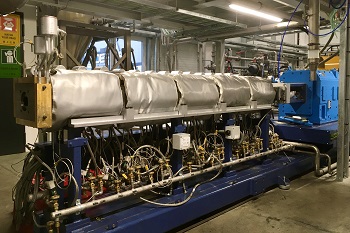
The first stages
The first trial set-up was on readiness at JSW’s Technical Center Dusseldorf/Germany in June 2020. “The basis was our co-rotating TEX44αIII twin-screw extruder. We had to convert it beforehand for the high-temperature depolymerization of post-industrial and end-of-life PMMA waste. Our plant in Japan designed and built the necessary components according to our conceptual specifications and implemented the corresponding computer programmes," explains Makoto Tojo.
Initially, as the first step, relatively pure PMMA waste was processed. In the following two trials in 2020, the focus was on contaminated PMMA waste material. "These are clearly difficult-to-regenerate wastes in various degrees of contamination, colours et cetera”, admits the Technical Manager, “and we were finally able to convert these into high-quality secondary raw material, rMMA.” The depolymerization process is conducted by melting the material in the upstream zone of the special TEX44αIII twin-screw extruder, then heating the melt up to depolymerization temperature and converting it into gaseous matter in the downstream zone of the extruder, absorbing the liquefied product in the subsequent condensation tank. JSW achieved the target rMMA purity, and the rMMA was delivered to Speichim and Arkema for further processing and application.
According to an MMAtwo newsletter, "in November 2020, a whole week of small-scale depolymerization trials (corresponding to a capacity of about 1,000 tonnes/year) were carried out in Düsseldorf, using various PMMA wastes as feedstock for the production of high-quality rMMA. Among the wastes, all of which were processed using the MMAtwo technology, were end-of-life PMMA WEEE wastes and PMMA composite wastes, which provided excellent yields of regenerated crude MMA.”
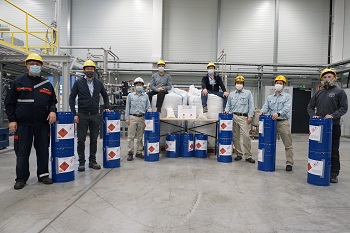
The next stages
In spring 2021, the fourth test series is to be tackled „We are getting closer and closer to the industrial, commercially highly interesting implementation of our PMMA depolymerization project. The personnel requirements are significantly lower compared to the competing conventional process. The ecological advantage, sustainability and operator safety are unquestionable”, concludes Makoto Tojo.
For 2021, two to three additional experimental test campaigns are on the agenda. JSW Europe’s contribution - developing a technical solution for the monomerization of various PMMA wastes - is close at hand. Shortly after the end of the project, the first commercial plant is to be put into operation.













